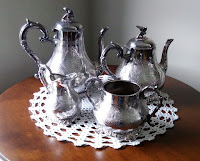52 Ancestors - Week 14 - Maiden Aunt - Lydia Woolcock
The term "maiden aunt" is negative, but my grandfather's maiden aunt, Lydia Woolcock, was destined to make a difference regardless of marital status. Sadly, until I started my family history research, I had never heard of her. Did any of her fifteen New Zealand half-nieces and nephews know about her either?
Lydia, an only child, was born in 1854 into a middle class Cornwall farming family with incredibly strong Wesleyan roots. Her mother, Betsy Lawry, was the cousin of the Rev. Walter Lawry, who was the second Wesleyan minister to New South Wales, the first missionary to Tonga and later superintendent of the Wesleyan missions in New Zealand and Fiji. Betsy had married at 43 and must have been surprised to have Lydia, the honeymoon baby, the following year. Betsy's husband, Charles Woolcock, a mere lad of 25, was a successful farmer who had aspirations. Why he married a woman so much older than himself is anyone's guess. Was there pressure from his widowed mother perhaps, so that Betsy would not become the "maiden aunt"?
Unsurprisingly, the marriage did not last and before Lydia was ten, her father had deserted her mother and disappeared to New Zealand. The resourceful Betsy took legal steps to safeguard her property and assets and within a few years, she and Lydia had set themselves up as drapers in Croydon. Sadly, Betsy passed away when Lydia was 22.
After her mother's death, Lydia continued in the drapery, but by her 30s must have decided she had more to offer. She trained as a Sister of the Children with Rev. Thomas Bowman Stephenson, who founded the National Children's Homes in the United Kingdom. In spite of little experience of children, Lydia became a talented nurse and administrator. By 1891, she was matron of a children's home in Hampshire, and then a home at Chipping Norton. By 1904, Sister Lydia was the first matron of the Penhurst home. This was no ordinary children's home, and at that time, must have been revolutionary. Penhurst was a home and residential school for physically disabled children. Its aim was to give these children the skills to become as mobile and independent as possible. As well as the usual education, there was an emphasis on music and singing as well as practical skills like basketwork and rug making that might later earn them a living. I'm not quite sure how long Sister Lydia remained there but Penhurst didn't close until 2013. For over 100 years, it had continued to provide care and education for disabled children just like those Lydia herself had nurtured.
Lydia passed away in Cheltenham in 1929 and I've always wondered if Penhurst was the beneficiary of her 342 pound estate.
Today, Victorian children's homes are not always seen in the best light. I'd like to think that we can admire women like Lydia, who cared enough to demonstrate Christian charity rather than just preach about it. Lydia may have been a "maiden aunt" but her legacy means that most children today are treated equitably and with respect regardless of disability.
Lydia, an only child, was born in 1854 into a middle class Cornwall farming family with incredibly strong Wesleyan roots. Her mother, Betsy Lawry, was the cousin of the Rev. Walter Lawry, who was the second Wesleyan minister to New South Wales, the first missionary to Tonga and later superintendent of the Wesleyan missions in New Zealand and Fiji. Betsy had married at 43 and must have been surprised to have Lydia, the honeymoon baby, the following year. Betsy's husband, Charles Woolcock, a mere lad of 25, was a successful farmer who had aspirations. Why he married a woman so much older than himself is anyone's guess. Was there pressure from his widowed mother perhaps, so that Betsy would not become the "maiden aunt"?
Unsurprisingly, the marriage did not last and before Lydia was ten, her father had deserted her mother and disappeared to New Zealand. The resourceful Betsy took legal steps to safeguard her property and assets and within a few years, she and Lydia had set themselves up as drapers in Croydon. Sadly, Betsy passed away when Lydia was 22.
After her mother's death, Lydia continued in the drapery, but by her 30s must have decided she had more to offer. She trained as a Sister of the Children with Rev. Thomas Bowman Stephenson, who founded the National Children's Homes in the United Kingdom. In spite of little experience of children, Lydia became a talented nurse and administrator. By 1891, she was matron of a children's home in Hampshire, and then a home at Chipping Norton. By 1904, Sister Lydia was the first matron of the Penhurst home. This was no ordinary children's home, and at that time, must have been revolutionary. Penhurst was a home and residential school for physically disabled children. Its aim was to give these children the skills to become as mobile and independent as possible. As well as the usual education, there was an emphasis on music and singing as well as practical skills like basketwork and rug making that might later earn them a living. I'm not quite sure how long Sister Lydia remained there but Penhurst didn't close until 2013. For over 100 years, it had continued to provide care and education for disabled children just like those Lydia herself had nurtured.
Lydia passed away in Cheltenham in 1929 and I've always wondered if Penhurst was the beneficiary of her 342 pound estate.
Today, Victorian children's homes are not always seen in the best light. I'd like to think that we can admire women like Lydia, who cared enough to demonstrate Christian charity rather than just preach about it. Lydia may have been a "maiden aunt" but her legacy means that most children today are treated equitably and with respect regardless of disability.


Comments
Post a Comment